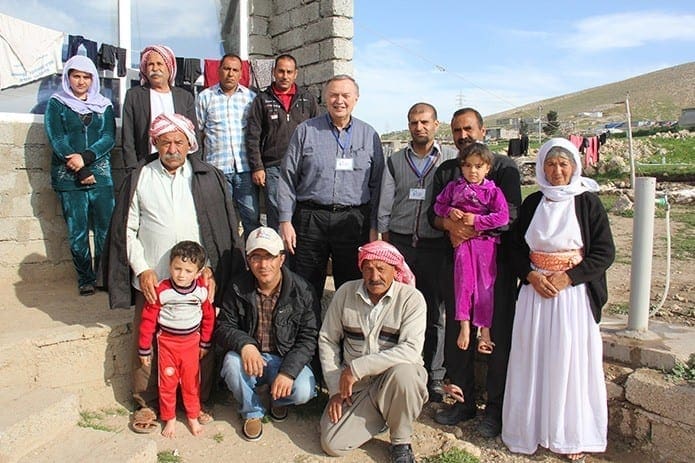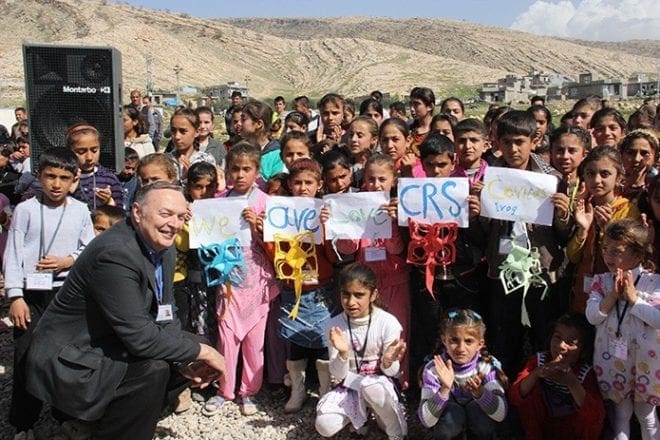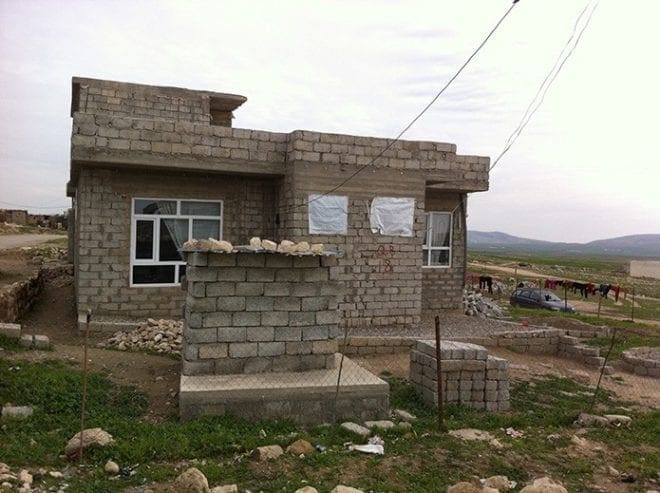 Photo By Catholic Relief Services
Photo By Catholic Relief ServicesAtlanta
Southeast director describes Catholic relief efforts in northern Iraq
By NICHOLE GOLDEN, Staff Writer | Published May 14, 2015
ATLANTA—Cullen Larson, Southeast regional director for Catholic Relief Services, is back home in Atlanta after serving for two months in northern Iraq.
Larson was there in February and March to fill in for the agency’s permanent country representative who had been serving both Iraq and Egypt.
“Country representative is the lead person on behalf of the agency in any country where we work,” explained Larson. “It’s kind of the strategic leadership position.”
Larson spent three weeks in the Kurdistan region of Iraq supporting the work of Caritas, the international Catholic aid agency.
The two partners are working to assist families displaced by the Islamic State takeover of the city of Mosul, which had over 1 million residents, and its surrounding villages last summer. Many of the uprooted people have few or no possessions, and their family members have been killed.
“Lots of people were on foot,” said Larson. “The immediate needs were food and water. People came in waves.”

Children from internally displaced families in Iraq celebrate the opening of a new child-friendly space in northern Iraq with Cullen Larson, front left, of Catholic Relief Services in Atlanta. Most of the displaced children are no longer attending school and Caritas and CRS are working to provide them informal educational activities in a safe environment. Photo By Catholic Relief Services
Caritas and CRS jointly employ 151 staff members at offices in Dohuk and Irbil, Iraq, to help so-called IDPs—internally displaced persons—with their basic and changing needs.
“A lot of the people who work are IDPs themselves,” explained Larson.
Employing local people helps relief agencies to better understand culture, language and context.
“Our work teams are still joint. They’re getting there,” said Larson of Caritas’ efforts.
Caritas Iraq is headquartered in Baghdad and had no presence in the region prior to last August. CRS’ role is to help build up Caritas there.
“Wherever we go, it’s at the invitation of the local church,” said Larson.
The agencies also coordinate with other programs such as the United Nations’ World Food Programme to avoid duplication of efforts.
The idea is to help the “most vulnerable and least served,” said Larson.
CRS puts effort into temporary homes
While the Iraqi government did set up camps for 2.2 million displaced people, only one-third of those people reside in the camps.
Together with Caritas, CRS is finding housing, winterizing concrete structures, distributing kerosene, cash and vouchers, and establishing safe places for children to gather.
Larson explained there are many unfinished concrete block buildings in the region. The structures have no windows or doors but enough of a roof to be used as homes for families.
“That turned out to be an asset,” said Larson. “We negotiated with the owners.”
These negotiations will allow families to stay in the structures for two winters.
Local contractors helped winterize the homes with PVC-framed doors and double pane windows. Each building can house four families of six people each with some measure of privacy and insulation.
“I came away with the feeling that was more dignity than the camps,” said Larson.
Since last fall, 422 buildings have been winterized, providing haven to more than 12,600 people. Approximately 1,000 more structures will undergo improvements to house additional families.
Blankets, kerosene, cooking pots and jugs for transporting kerosene have also been distributed. Families can receive 39 liters of kerosene at one time, enough to cook food for several weeks.
Creating places for classes, counseling for children
Nearly all of the displaced in the Dohuk region are Yazidis, a religious minority targeted and traumatized by abductions and massacres by the Islamic State, known by the acronym ISIS.
“They have been at the bottom of the pile for generations,” said Larson of the persecution of Yazidis.
With the help of an interpreter, Larson conducted a needs’ assessment with heads of households and heard several speak of mass graves in their native villages. Many of them had been trapped on Sinjar Mountain while fleeing ISIS militants last August. They just started walking off the mountain in desperation as others began dying of thirst.
“They were going to die where they were,” said Larson.
“They have nightmares. They can’t sleep,” he added.
Many of them talk about needing work. “The fathers are just crushed,” said Larson.
They also speak about the need for international protection.

CRS and Caritas staff winterized more than 400 abandoned concrete structures with double pane windows and PVC framed doors in northern Iraq to provide homes for families traumatized by ISIS militants. Photo By Catholic Relief Services
While job training can be provided, international protection is not something CRS or Caritas can offer.
“But I can tell folks that,” said Larson about subsequent meetings with elected officials.
CRS also helped provide several child-friendly places to offer informal educational activities and trauma counseling. Three-quarters of the displaced children are not attending school due to curriculum and language differences and overcrowding.
Still, the children are remarkably resilient and can be seen giggling and playing.
“Little boys were selling daffodils by the side of the road,” said Larson.
Dr. Emad Noel is the director of Caritas Iraq in Dohuk and is a Chaldean Catholic. Larson explained that Noel had been an engineering professor at the University of Mosul.
“He got out in time,” said Larson.
While in Dohuk, Larson was able to attend Mass at the cathedral.
“It’s just great,” he said of the chance to hear Mass celebrated in the languages there.
Larson also had the opportunity to meet with Bishop Rabban al-Qas and see firsthand the school operated by the Chaldean church for 250 high school students of various faiths.
“This guy lights up when he talks about the school,” said Larson.
The success of the school “paints a picture” of how it could be in Iraq, where there’s historically not been a lot of trust among ethnic groups.
“It’s still very early,” said Larson. Lots of rebuilding from trauma is needed.
“Peace-building is a long, important process,” said Larson.
Meanwhile, the humanitarian efforts will continue in Iraq. In addition to the internally displaced Yazidis, Christians, and Shiite and Sunni Muslims, Iraq is hosting 230,000 refugees from neighboring Syria.
Larson said funds are needed, but there are other vital ways Catholics can support the assistance programs of Catholic Relief Services.
“We ask people for prayer (and) to take the time to learn,” said Larson.